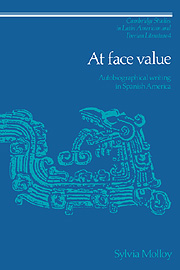Book contents
- Frontmatter
- Contents
- Acknowledgments
- Introduction
- PART I THE SCENE OF READING
- 1 The reader with the book in his hand
- 2 From serf to self: the autobiography of Juan Francisco Manzano
- 3 The theatrics of reading: body and book in Victoria Ocampo
- PART II CHILDHOOD AND FAMILY TALES
- PART III MEMORY, LINEAGE AND REPRESENTATION
- Notes
- Bibliography
- Index
3 - The theatrics of reading: body and book in Victoria Ocampo
Published online by Cambridge University Press: 14 September 2009
- Frontmatter
- Contents
- Acknowledgments
- Introduction
- PART I THE SCENE OF READING
- 1 The reader with the book in his hand
- 2 From serf to self: the autobiography of Juan Francisco Manzano
- 3 The theatrics of reading: body and book in Victoria Ocampo
- PART II CHILDHOOD AND FAMILY TALES
- PART III MEMORY, LINEAGE AND REPRESENTATION
- Notes
- Bibliography
- Index
Summary
I experienced everything through the transmuted substance of my body … I had no other thing to offer under the species of linked words, under the bread and wine of the spirit we call literature. That, in sum, could well be the epigraph of every one of my texts … The more I strayed from it, childishly heeding who knows what convention of the hateful “I”, the weaker my writing was – flabby, without substance.
Victoria Ocampo, AutobiografíaBooks, many books are mentioned throughout Victoria Ocampo's texts. If autobiographies are wont to highlight the privileged encounter with the written word as a symbolic beginning for their life stories, an acknowledgment of the very tools for self-definition, this highlighting usually occurs, emblematically, close to the beginning of their narrative. In the case of Victoria Ocampo, however, there is no such clearcut inception of the readerly into the life story; not one, not two, but many encounters with books are described in her text. The significant gesture is tirelessly repeated: one scene of reading brings on another, book follows upon book and discovery upon discovery, so that we are left with many beginnings; so many, in fact, that they blur into a dizzying continuum in which the bare gesture – reading – perpetuates itself as the self-sustaining motion of one, consistent autobiographical act.
I have already referred to Ocampo's initial version of the scene of reading, recorded amongst her earliest childhood recollections.
- Type
- Chapter
- Information
- At Face ValueAutobiographical Writing in Spanish America, pp. 55 - 76Publisher: Cambridge University PressPrint publication year: 1991



